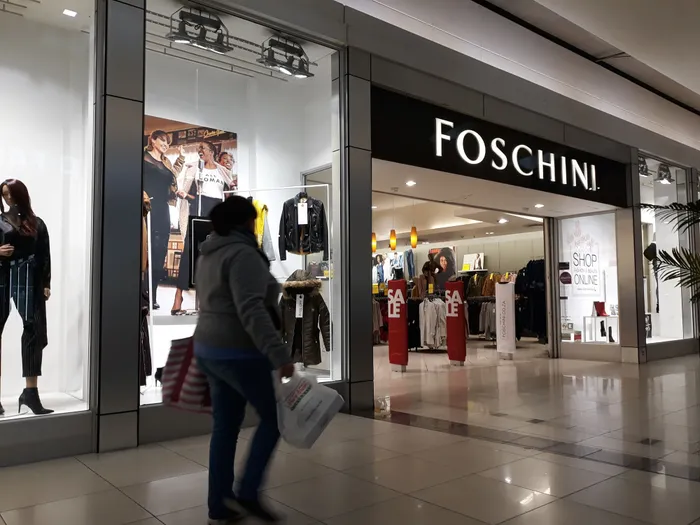
A Foschini Group store in Johannesburg. The groups' sales in its TFG Africa unit flattened in June 2025 in line with the same period a year before but had inceased by a string 9.2% in the three weeks to July 19.
Image: Karen Sandison/African News Agency
The Foschini Group’s (TFG) share price plunged over 7% on Thursday morning after the clothing and accessories retailer reported that June sales in its TFG Africa segment had flattened, following a first eight weeks of strong sales for the 2026 financial year.
The share price was trading at R110.96 on Thursday morning, which was also 15.3% lower than the price a year ago.
In the first eight weeks of the quarter to end-June 2025, the group reported a strong 9.9% increase in sales due to the timing shift of the Easter holidays into April and favourable winter conditions against a prior-year base impacted by pre-election consumer caution in 2024.
However, June 2025 sales slowed and were flat, while total market retail sales reported by the Retail Liaison Committee (RLC) fell by 4%.
“The impact was intensified by the shift of school holidays from the last two weeks of June into July, leading to higher promotional activity across the market,” TFG's directors said.
Nevertheless, for the three weeks to July 19, 2025, TFG Africa's sales had increased by 9.2%. One hundred new stores were expected to be opened in the 2026 financial year.
First quarter store sales rose by 3.2%, complemented by a strong online sales performance. The store network expanded by a net 3 stores, bringing TFG Africa's total store count to 3 617.
At the end of the three-month period, TFG Africa’s sales were up 5.2%, TFG London sales were up 57.7%, and TFG Australia sales fell by 2.8%. Excluding last year’s acquisition of White Stuff, comparable group sales grew 2.5%, and TFG London sales declined by 2.6%.
This brought overall group sales 11.5% higher to R14.4 billion in the quarter. Group online sales grew by 45.5% and now contributes 14.5% to total retail sales, aided by the acquisition of White Stuff. TFG Africa online sales grew by 40.2%, driven by the Bash platform.
Market share gains in South Africa of 50 basis points were reported in the TFG Africa segment, outperforming total market retail sales growth, according to RLC data.
In TFG Africa, clothing sales increased by 4.2% over the same quarter a year ago, homeware sales increased by 8.5%, beauty product sales were up by 24.5%, jewelry sales increased by 0.3%, and cellular sales were up 2.8%.
Credit sales increased by 9.3% and now contribute 28.2% of TFG Africa sales, with the debtors' book growing by 9% to R9.1bn. Acceptance rates for new accounts increased by 0.5% to 20.3%.
In the clothing segment, sales increased by 4.2% while comparable sales grew 0.3%. The segment experienced a strong 7.4% growth in April and May.
The beauty segment maintained strong growth, with sales rising 24.5%, achieving further market share gains in line with strategy.
TFG London was impacted by the continued weak UK economy, but the addition of White Stuff saw sales increase by 57.7%—excluding White Stuff, sales declined by 2.6%. Online sales were up by 55.9%, contributing 43.1% of total TFG London sales.
TFG Australia continued to face sustained high inflation and interest rates impacting the consumer. Sales were 2.8% lower in Australian dollars, with a mixed performance in a highly promotional market.
In the UK, sales growth was 68.8% for the three weeks to July 19. Excluding White Stuff, sales growth was 6.3%.
In Australia, sales contracted by 4.1% in the three weeks ended July 19. However, the economy appeared to be stabilising, with two quarter-percent interest rate reductions in recent months.
BUSINESS REPORT